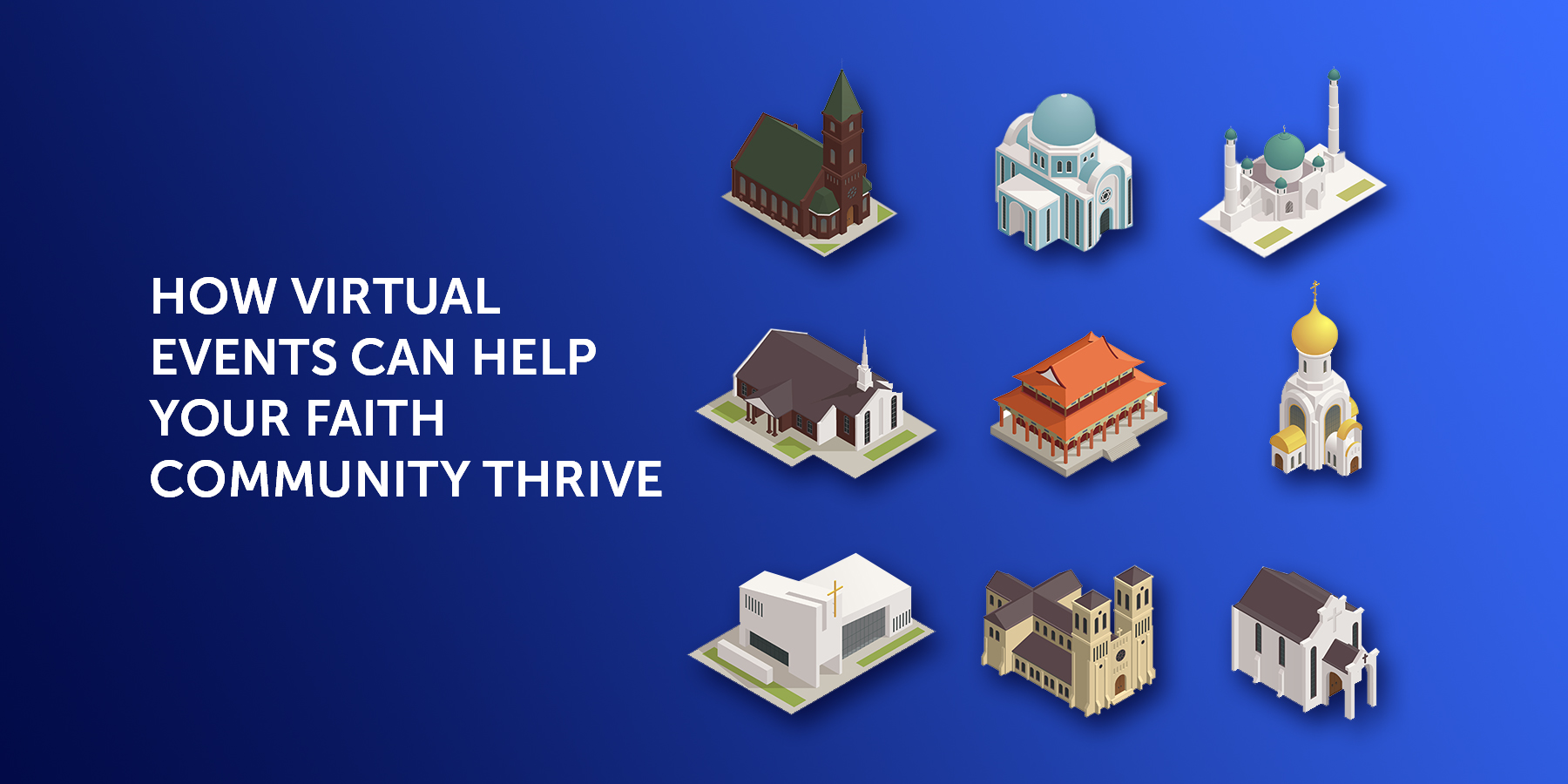When it comes to faith, nothing is more important than congregational closeness. After all, seeing one another face-to-face and sharing unique praying experiences is what prompts deep spiritual engagement for believers. But it's not as simple to recreate this level of closeness when the global pandemic and social distancing measurements make it impossible to gather together in the house of worship.
Needless to say, faith leaders are under immense pressure to connect with their communities and provide the guidance and support they need during times of crisis. It’s not enough to plan faith-based events in an isolated manner; the physical congregants - as well as online audiences - need real-time, genuine interactions that'll guide them through the uncertainty in these changing times.
One area that has the potential to impact faith services and events is virtual events. While many religious figures turned to online streaming technology, hoping to provide spiritual nourishment by recording their services, it's becoming apparent that live-streaming isn’t a viable enough long-term solution to maintain and grow congregations; whereas virtual events provide religious communities with the opportunity to foster deeper, more meaningful interactions.
When live-streaming faith-based experiences is no longer enough
When congregations were forced to close their doors and turn worshipers away, broadcasting their services seemed like the perfect temporary alternative as opposed to stopping religious activities completely. And it certainly was the right course of action as it allowed community members to not feel alone during the first months of isolation. However, it wasn't long before faith leaders and congregants began feeling disengaged from the other members and possibly their faith too.
Live streaming offers many benefits but real-time interactions aren't one of them, though the ability to connect with other like-minded religious leaders, pray together and engage in genuine dialogue and find support during this time is paramount for a strong faith community. It's difficult for worshippers to fully immerse themselves in the experience when streaming religious services or events feels like watching Netflix.
Furthermore, we have been living mostly in digital reality for a year now, and the lack of human interactions is starting to take a toll on our mental health. People feel demotivated, helpless and frightened of what the future holds. Watching a live broadcast of Sunday service simply doesn't offer the same level of support as being there physically, especially if congregants are unable to give or receive emotional and spiritual support from other members.
Not to mention that faith-based events go beyond regular services, including festivals, group meetings or important community initiatives. While those gatherings could be broadcasted, they rely largely on active audience participation to elicit and share faith. We can't also fail to mention other crucial reasons behind religious events, such as attracting new members or collecting donations that allow congregations to best serve their communities. Those gatherings simply require faith leaders to make themselves available to answer any questions or join the discussion as it happens.
This has forced leaders of faith communities, churches, mosques, temples and synagogues to rethink their approach to keeping the faithful online and find an alternative that enables congregation members to actively engage in religious initiatives and meet their emotional and spiritual goals - thus, virtual events. Most virtual event platforms come equipped with robust engagement features that enable worshippers to communicate with each other, congregation leaders and the event content itself in real-time.
There are no limits as to what type of faith-based rituals could be hosted in a virtual setting - weddings, bar mitzvahs, confirmations, baptisms or even matrimonial, fundraising and educational festivals. While most in-person religious events remain unreachable to worshipers, virtual events empower congregations to not only survive the current climate but also to thrive and grow deeper in faith together.
Examples of faith-based virtual events
MuslimFest
MuslimFest first launched in 2004 and today, it's an award-winning annual festival hosted to recognize and acknowledge the best in Muslim entertainment and arts. Once only a local event, MuslimFest is now the biggest festival of its kind for the Muslim communities in the USA and Canada.
UPCI General Conference
UPCI General Conference is the hallmark event of the United Pentecostal Church International, where attendees conduct business, elect leaders, network with colleagues, participate in worship sessions, and raise funds for various ministries.
CMN Momentum'
CMN Momentum' is an international conference and tradeshow organized by the Catholic Marketing Network, where businesses and ministries that serve the needs of Catholics are excited to approach new clients, connect with other professionals in the field and network to discover new strategic partnerships and opportunities.
Live It Loud Conference
RCCG Canada National Young Adult Conference (YASM Canada) is an annual event for young adults from across Canada to experience and celebrate Jesus. This year's conference featured virtual breakout sessions, intense worship and high praise amongst others and was completely free of charge.
Final thoughts
Social distancing and the inability to gather in-person to share religious experiences have resulted in many members disconnecting from their communities emotionally and spiritually. Not even live streaming faith services could prevent that from happening; people feel alone more than ever. For religious leaders to restore faith and bring their congregants together again, they must look beyond broadcasting spiritual events and look for alternatives that encourage active worshipper participation.
In other words, live streaming is what allowed religious communities to survive when the global pandemic started; virtual events is what will help them thrive as we await for normal life to return. Thanks to virtual event software, it's not just about watching but actually acting as a part of the experience, which is exactly what faith communities need in such uncertain times.
Are you interested in finding out more about how virtual events can help you strengthen faith amongst your congregation's members? Learn more about our virtual worship and faith events services, or reach out today and speak to one of our representatives!







